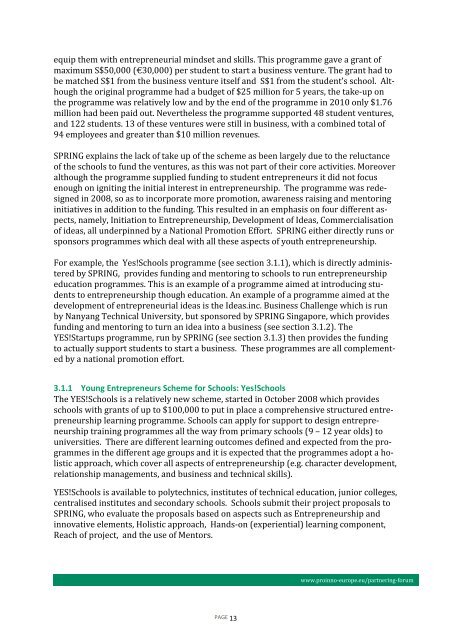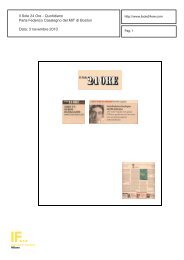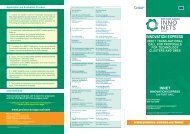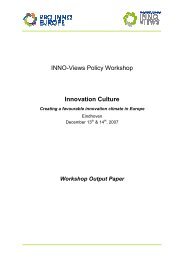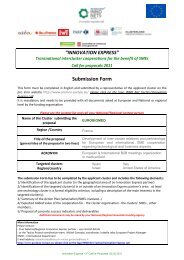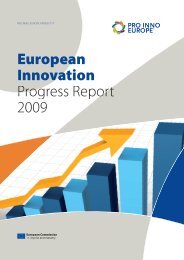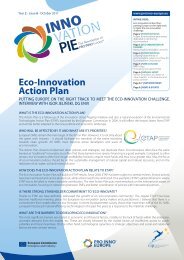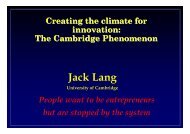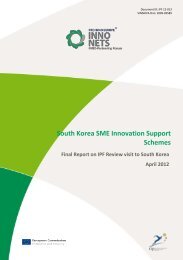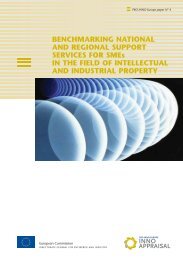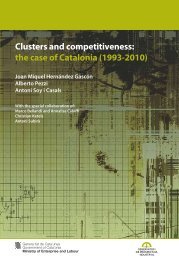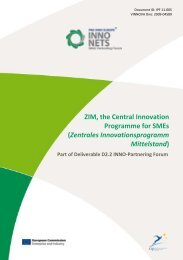Singapore SME Innovation Support Schemes - PRO INNO Europe
Singapore SME Innovation Support Schemes - PRO INNO Europe
Singapore SME Innovation Support Schemes - PRO INNO Europe
You also want an ePaper? Increase the reach of your titles
YUMPU automatically turns print PDFs into web optimized ePapers that Google loves.
equip them with entrepreneurial mindset and skills. This programme gave a grant of<br />
maximum S$50,000 (€30,000) per student to start a business venture. The grant had to<br />
be matched S$1 from the business venture itself and S$1 from the student’s school. Although<br />
the original programme had a budget of $25 million for 5 years, the take-up on<br />
the programme was relatively low and by the end of the programme in 2010 only $1.76<br />
million had been paid out. Nevertheless the programme supported 48 student ventures,<br />
and 122 students. 13 of these ventures were still in business, with a combined total of<br />
94 employees and greater than $10 million revenues.<br />
SPRING explains the lack of take up of the scheme as been largely due to the reluctance<br />
of the schools to fund the ventures, as this was not part of their core activities. Moreover<br />
although the programme supplied funding to student entrepreneurs it did not focus<br />
enough on igniting the initial interest in entrepreneurship. The programme was redesigned<br />
in 2008, so as to incorporate more promotion, awareness raising and mentoring<br />
initiatives in addition to the funding. This resulted in an emphasis on four different aspects,<br />
namely, Initiation to Entrepreneurship, Development of Ideas, Commercialisation<br />
of ideas, all underpinned by a National Promotion Effort. SPRING either directly runs or<br />
sponsors programmes which deal with all these aspects of youth entrepreneurship.<br />
For example, the Yes!Schools programme (see section 3.1.1), which is directly administered<br />
by SPRING, provides funding and mentoring to schools to run entrepreneurship<br />
education programmes. This is an example of a programme aimed at introducing students<br />
to entrepreneurship though education. An example of a programme aimed at the<br />
development of entrepreneurial ideas is the Ideas.inc. Business Challenge which is run<br />
by Nanyang Technical University, but sponsored by SPRING <strong>Singapore</strong>, which provides<br />
funding and mentoring to turn an idea into a business (see section 3.1.2). The<br />
YES!Startups programme, run by SPRING (see section 3.1.3) then provides the funding<br />
to actually support students to start a business. These programmes are all complemented<br />
by a national promotion effort.<br />
3.1.1 Young Entrepreneurs Scheme for Schools: Yes!Schools<br />
The YES!Schools is a relatively new scheme, started in October 2008 which provides<br />
schools with grants of up to $100,000 to put in place a comprehensive structured entrepreneurship<br />
learning programme. Schools can apply for support to design entrepreneurship<br />
training programmes all the way from primary schools (9 – 12 year olds) to<br />
universities. There are different learning outcomes defined and expected from the programmes<br />
in the different age groups and it is expected that the programmes adopt a holistic<br />
approach, which cover all aspects of entrepreneurship (e.g. character development,<br />
relationship managements, and business and technical skills).<br />
YES!Schools is available to polytechnics, institutes of technical education, junior colleges,<br />
centralised institutes and secondary schools. Schools submit their project proposals to<br />
SPRING, who evaluate the proposals based on aspects such as Entrepreneurship and<br />
innovative elements, Holistic approach, Hands-on (experiential) learning component,<br />
Reach of project, and the use of Mentors.<br />
PAGE 13<br />
www.proinno-europe.eu/partnering-forum


